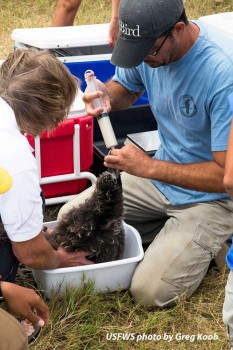Lindsay Young of Pacific Rim Conservation has reported on a successful operation to remove a piece of ingested plastic and pieces of a red balloon from a Laysan Albatross Phoebastria immutabilis chick. The bird was being hand-reared at the James Campbell National Wildlife Reserve on the Hawaiian island of Oahu as part of an attempt to create a new colony not subject to predicted sea-level rise.
The translocated chick, which was underweight when collected was failing to thrive and gain mass, but after removal of the foreign items went on to fledge successfully (although still underweight); read her illustrated account here. A video clip taken during an endoscopy that followed an ultrasound scan of the albatross reveals the offending items.

A hand-reared Laysan Albatross chick gets a meal, photograph by Greg Koob, USFWS
Meanwhile, over in Australia, a balloon and a plastic spoon have been removed from the stomach of a Southern Giant Petrel Macronectes giganteus in a similar operation (click here). In both cases the ballons were coloured red, suggesting a preference for items of that colour -as has been suggested for North Pacific albatrosses swallowing cigarette lighters. Seems the lyrics of the "Red Balloon" song by Charli XCX need a rewrite:
"If you got troubles, let 'em go
Let 'em soar so high, high into the sky
Just like a red balloon
Ah ooh!
Don't let your worries get to you
Let 'em float on by, high into the sky
Just like a red balloon"
(click here).
Reference:
Cooper, J. Auman, H.J. & Klavitter, J. 2004. Do the albatrosses of Midway Atoll select cigarette lighters by color? Pacific Seabirds 31: 2-4.
John Cooper, ACAP Information Officer, 11 August 2017

 English
English  Français
Français  Español
Español